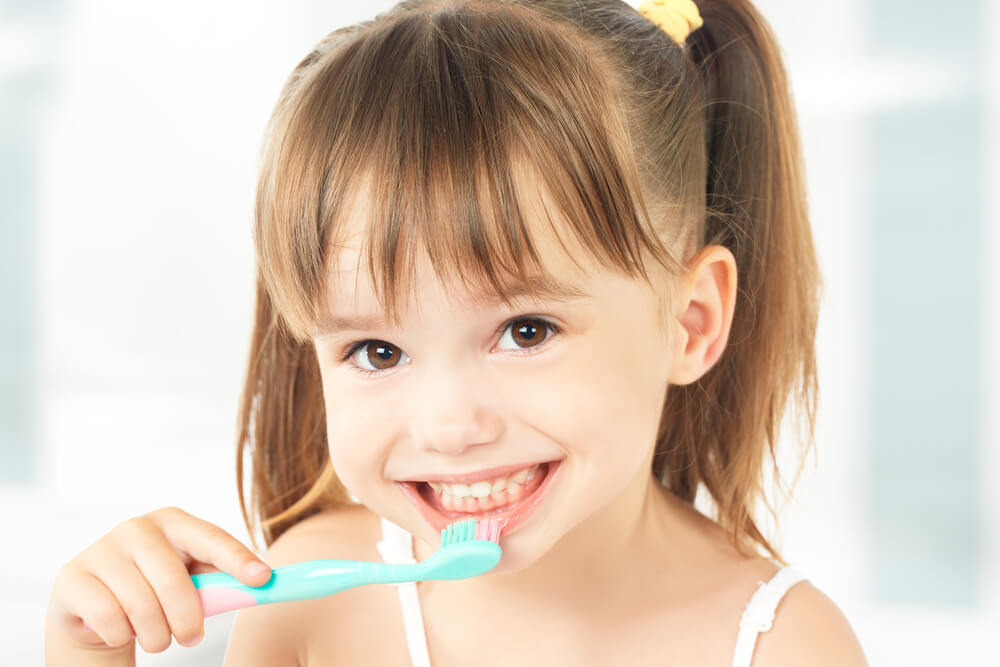
After a lot of drooling, plenty of teething rings and usually some sleepless nights, your baby is sporting their first tiny pearly whites. It’s a momentous occasion! By age three, they’ll probably have a complete set. While adorable, your little one’s grin will go through more dramatic changes a few years later when they start to lose those heard-earned teeth. Given their fleeting nature, why do baby teeth matter? Aren’t they just going to fall out anyway? Well, they will eventually be replaced by the big, bad permanent teeth but in the meantime, they need to stick around until they’re ready to be added to the Tooth Fairy’s collection. While the importance of primary teeth is often underestimated, they serve a number of purposes and play a crucial role in your child’s oral health and development.
The Baby Teeth Basics
Primary teeth go by a variety of names, including baby teeth, deciduous teeth, temporary teeth and milk teeth. Whatever term suits your fancy, they’re actually already in your baby’s mouth at birth just waiting under the gums for their moment to make an entrance. The first tooth usually erupts around six months of age with the last typically coming in by three-years-old. The baby teeth then fall out, or shed, beginning at six or seven all the way through age 12. However, most people don’t have all 32 permanent chompers for quite some time. In fact, it can take up until you’re 21-years-old for it to happen.
Book Your Free Consultation Today!
The Functions of Primary Teeth
Now, on to the functions of baby teeth. Some of their roles include:
- Saving Space and Encouraging Proper Development – Baby teeth act as placeholders and save room for the grown-up teeth to erupt correctly. They also facilitate proper jaw and muscle development and the development of facial features. If a baby tooth falls out early, the other teeth often shift to fill in the space, which can lead to misaligned permanent teeth and jaws and potentially the need for extensive orthodontic treatment or, in extreme cases, surgery and extractions. While a lot of kids may end up wearing braces or Invisalign Teen in their teenage years, the degree of misalignment and the complexity of their case will influence how complicated treatment is, as well as its duration and cost. Obviously, reducing the odds of serious orthodontic issues by keeping baby teeth healthy is preferable.
- Allowing for Proper Chewing – Over time, kids learn to chew correctly, which encourages good nutrition and overall health. When a child has tooth decay, malformed teeth or pain, they’ll stick with the foods that are the easiest to eat, which limits their diet and increases the chances they’ll be underweight, malnourished or deficient in vitamins and minerals.
- Aiding in Speech Development – Learning to talk is so crucial for your child’s cognitive and social development. The teeth play a part in our ability to speak clearly and produce certain sounds, particularly consonants. When the teeth are in the right place, we’re able to form sounds that rely on our tongue touching the top teeth, our teeth directing the flow of air or the tongue having enough room to do its thing. When kids lose their front teeth, they might temporarily have a lisp or make hissing sounds when talking but this goes away and they’ve already learned to speak correctly. If they’ve never had the chance to learn proper pronunciation, fixing the issue can be more difficult.
- Boosting Self-Esteem – Having a healthy, beautiful smile gives children confidence and they’ll be less likely to be distracted by tooth discomfort or insecurities about their appearance, allowing them to focus on school, socialization and just being a kid.
- Ensuring Long-Term Oral Health – Tooth decay can result in childhood gum disease, technically called periodontal disease. In early stages, gum disease can be treated and reversed. However, once it reaches the level of periodontitis, it can only be managed and not cured. Eventually, if not dealt with, gum disease causes the deterioration of the bone and tissues that hold the teeth in place, which can make them fall out.
Caring for Primary Teeth
Caring for baby teeth starts a few days after birth. Even though your infant isn’t eating solid food, the natural sugars in formula and breast milk can actually cause cavities. Simply wrap a wet washcloth or piece of gauze around your finger and use it to wipe down your child’s gums. If your water isn’t fluoridated or your little one won’t be drinking tap water, you should ask your pediatrician about fluoride supplements, which can usually be taken after six-months-old.
When your tot gets their first tooth, use a small, soft-bristled, infant-sized toothbrush and a smear of fluoride toothpaste to brush their teeth twice a day. As for flossing, once any two teeth are touching, help them floss once daily. For those ages two to five, brush their teeth in the morning and before bed for two minutes each time with a pea-sized dollop of fluoride toothpaste. You’ll need to help with brushing until they can do it effectively on their own. Once they have the skills to brush and floss, just be sure to monitor their oral hygiene routine until age seven or eight. Sealants and fluoride treatments can also be extremely beneficial for preventing cavities and a great way to bolster your efforts.
Aside from a stellar brushing and flossing routine, the most important thing you can do for your kiddo’s smile is see a dentist regularly for cleanings and checkups. The American Dental Association, American Academy of Pediatric Dentistry and the American Academy of Pediatrics all recommend children have their first dental visit six months after the first tooth erupts or no later than their first birthday. It’s always a good idea to find a pediatric dentist. They’ve had additional specialty training in the unique oral health needs of children and have expertise in behavioral techniques to make the process a lot easier on both kids and parents. Beyond keeping cavities and gum disease at bay, pediatric dentists can help you eliminate harmful oral habits like thumb sucking and point you in the right direction for a mouthguard to protect your child’s teeth during sports and activities.
When it comes to what foods can impact the health of baby teeth, sugary drinks like soda, sports drinks and fruit juice, as well as cookies, candy and other sweet treats are big tooth decay offenders. Limit things with added sugar and simple carbohydrates and, instead, opt for fresh vegetables and fruits, calcium-rich foods, whole milk for babies or low-fat milk for toddlers and school-aged kids, whole grains and lean protein. Water is the ideal beverage and never put your child to bed with a bottle even if it’s just milk. For even more pointers, check out our nutrition guide.
Now that you’re well-versed in baby teeth importance and how to care for them, set your child up for smile success by finding the right dental home. Do you live in the Denver area? Schedule an appointment at Kids Mile High Pediatric Dentistry and leave those primary teeth in the hands of a board-certified pediatric dentist in Englewood or Central Park. Our offices are super kid-friendly, fun and lively. In addition to making going to the dentist a positive experience, we’ll ensure their baby teeth are healthy and doing their job, so their permanent smile is a dazzling one.



